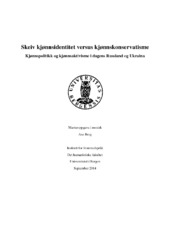Skeiv kjønnsidentitet versus kjønnskonservatisme. Kjønnspolitikk og kjønnsaktivisme i dagens Russland og Ukraina
Master thesis

Åpne
Permanent lenke
https://hdl.handle.net/1956/8787Utgivelsesdato
2014-08-31Metadata
Vis full innførselSamlinger
Sammendrag
In recent years Russia has attracted much attention from international media for its gender politics and gender activism. This interest peaked with the passing of the law on propaganda in June 2013. A survey from that summer showed that 88% of the population in Russia supported the law on propaganda. The main objective of this study is to present the wide range of responses to questions relating to gender and sexuality, in particular LGBT, which manifests itself in Russia and Ukraine today, especially how people and organisations choose to show their support or distance themselves from the gender policy conducted in Putin's Russia. My study concentrates on the period from February 2012 to February 2014. On the 21st of February 2012 the Pussy Riot protested in the Christ the Savior's Church (Khram Khrista Spasitelja) in Moscow and the subsequent arrest of three of the group members turned the world's attention to Russian laws and policy concerning gender and sexuality. The debate once again flared up when Russia hosted the Winter Olympics in February 2014. It is evident that Putin's Russia has turned towards old traditions and conservative values concerning religion, family, and sexual moral based on the assumption of two separate sexes, woman and man. The law on propaganda is one of the most explicit manifestations of this policy.